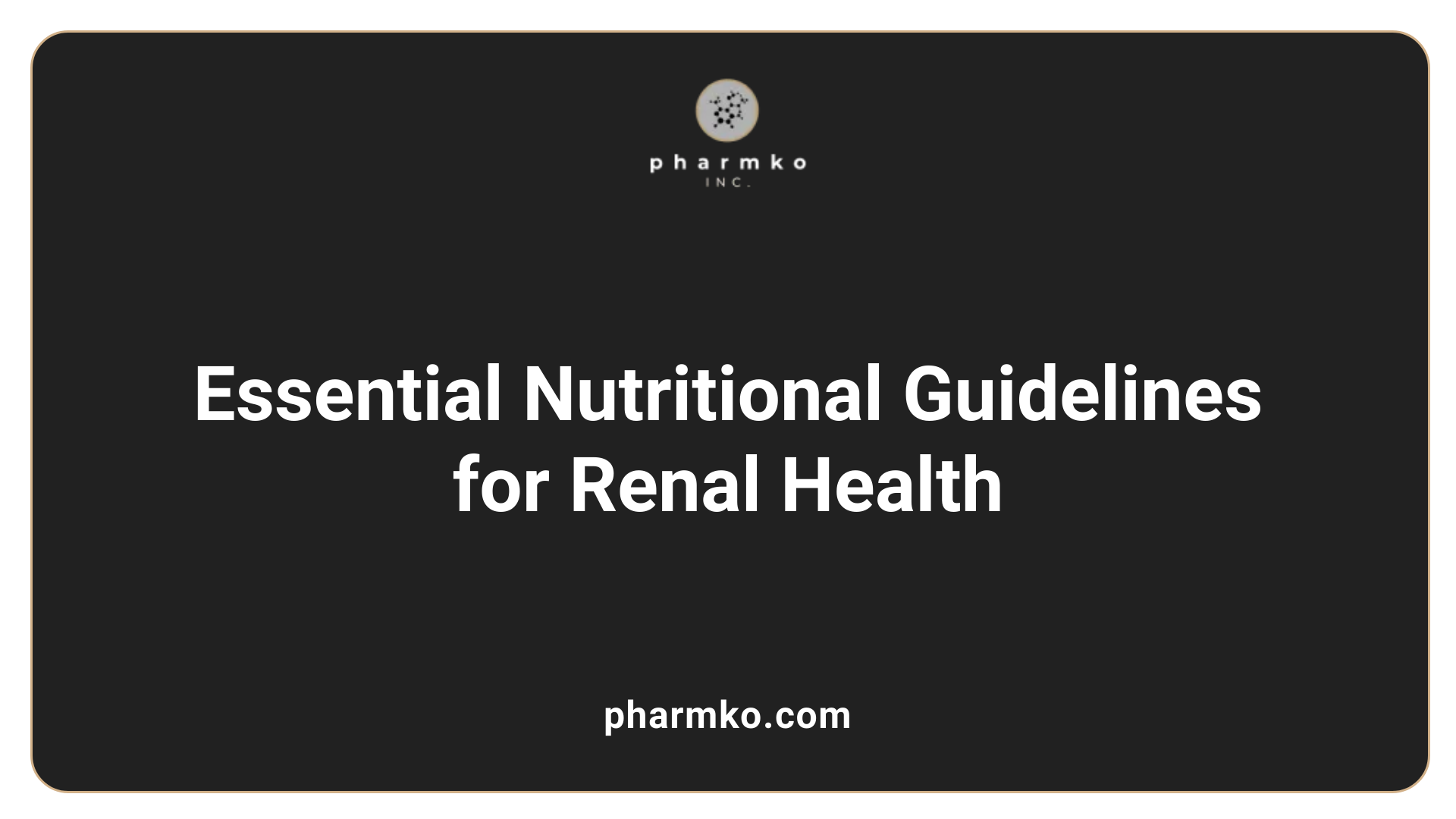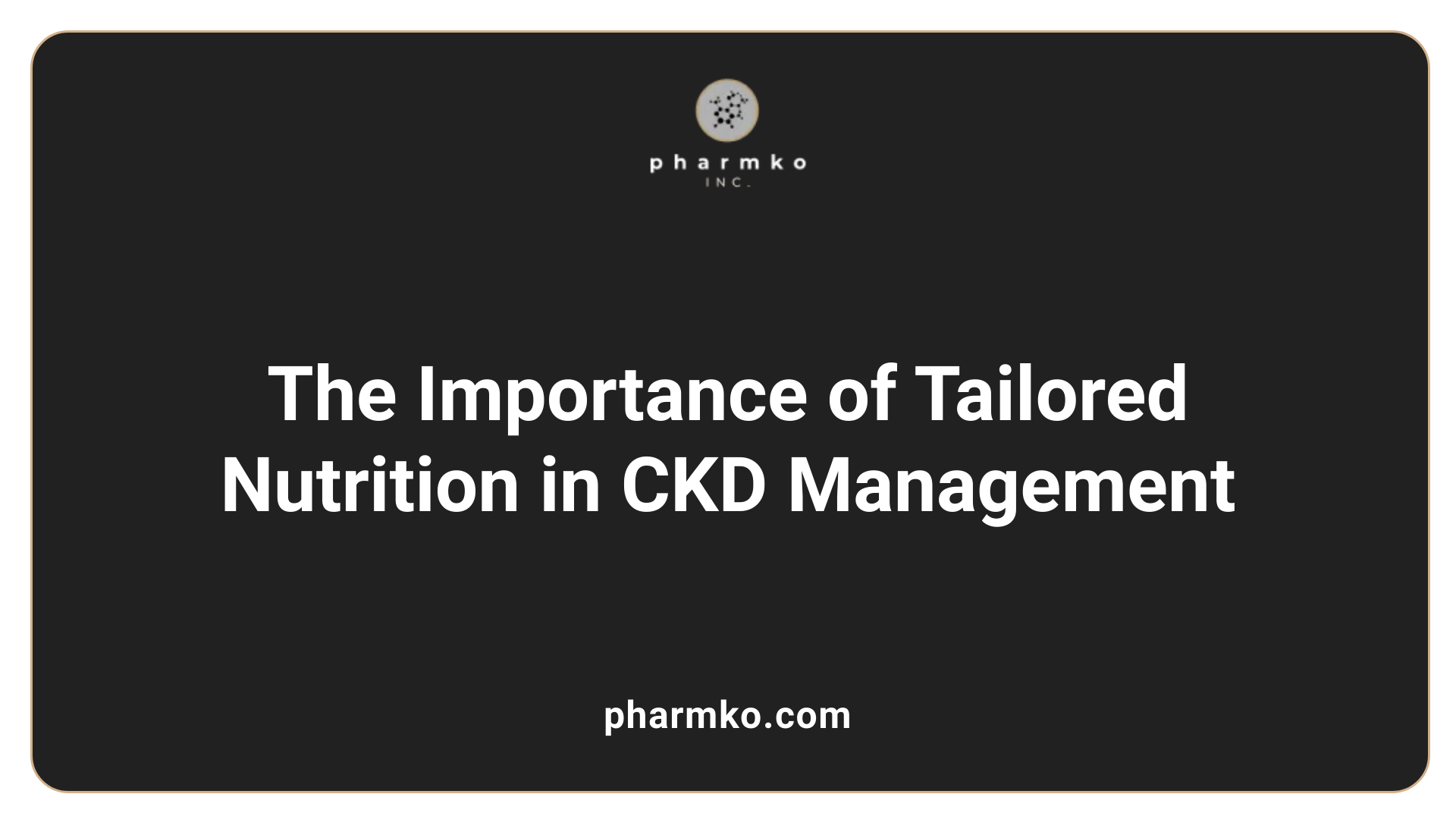Best nutrition options for renal patients
For individuals diagnosed with chronic kidney disease (CKD), dietary changes can play a significant role in managing the disease and improving quality of life. A kidney-friendly diet helps slow progression by reducing waste in the blood and managing levels of key minerals. This article explores the best nutrition options for renal patients, focusing on meal planning, essential dietary components, and foods to favor or avoid.
Understanding Nutritional Requirements for Renal Patients

What are the nutritional requirements for renal patients?
Nutritional requirements for renal patients involve several key limitations and recommendations to ensure proper health management.
-
Sodium Intake
- Limit to less than 2,000 mg per day to prevent fluid retention and high blood pressure.
- Fresh foods should be prioritized over processed foods, which often contain high sodium levels.
-
Potassium Levels
- Reduce intake to under 2,000 mg daily.
- High potassium foods such as bananas and oranges should be avoided, while low-potassium alternatives like apples and berries are recommended.
-
Phosphorus Control
- Maintain phosphorus intake within the range of 800 to 1,000 mg per day.
- This is crucial since impaired kidneys struggle to filter out excess phosphorus, which can lead to bone and cardiovascular issues.
-
Protein Sources
- Focus on high-quality protein sources while avoiding excess intake.
- Recommended amounts vary by CKD stage:
- Non-dialysis patients: 0.6 to 0.8 grams of protein per kilogram of body weight.
- Dialysis patients may need more, and should consult with a dietitian for tailored advice.
-
Fluid Management
- Fluid intake should be managed closely, especially in later stages of CKD, to prevent fluid overload.
- Strategies to cope with thirst can include sugar-free gum or rinsing the mouth with water.
Overall, a well-balanced diet emphasizing these elements can support kidney health and overall well-being.
Exploring the DASH Diet for Kidney Health

Overview of the DASH Diet
The DASH Diet, which stands for Dietary Approaches to Stop Hypertension, is highly recommended for individuals with chronic kidney disease (CKD). This diet emphasizes a high intake of fruits, vegetables, whole grains, and low-fat dairy products while limiting sodium, added sugars, and fats. By promoting nutrient-rich foods, the DASH Diet assists in managing blood pressure, a crucial factor in maintaining kidney health.
Benefits and Sample Meals for Renal Patients
This diet provides numerous benefits:
- Blood Pressure Management : Helps lower and control blood pressure, reducing strain on the kidneys.
- Nutrient-Rich : Provides essential vitamins and minerals, enhancing overall health.
- Weight Management : Encourages a healthy weight, reducing additional stress on kidney function.
Sample meals from the DASH Diet include:
- Breakfast : Pumpkin pancakes made with whole wheat flour and topped with fresh berries, providing fiber and antioxidants.
- Lunch : A chicken salad wrap using grilled chicken breast, leafy greens, and a whole grain tortilla, ensuring a balance of protein without excessive sodium.
- Dinner : Grilled fish served with steamed broccoli and quinoa, offering a healthy source of omega-3 fatty acids and low potassium content.
The DASH Diet is strongly endorsed by the National Kidney Foundation as a supportive framework for kidney health. However, it’s critical for individuals to consult with healthcare professionals to tailor the diet to their specific renal requirements.
Top Kidney-Friendly Foods

What are the most kidney-friendly foods?
A kidney-friendly diet emphasizes a variety of fruits and vegetables that are low in potassium, sodium, and phosphorus. Here are some preferred options:
Preferred Fruits and Vegetables
- Berries : Blueberries and strawberries are not only delicious but also rich in antioxidants while being low in potassium.
- Apples : They provide fiber and vitamin C, making them a healthy snack choice.
- Peaches : These are juicy and nutritious without the high potassium content.
- Cauliflower : A versatile vegetable that is both low in potassium and phosphorus.
- Cabbage : This cruciferous vegetable is also rich in vitamins and provides health benefits for the kidneys.
Variety of Recommended Protein Sources
For protein, it's best to select sources that won't stress the kidneys:
- Fish : Including omega-3 rich options like salmon and mackerel can be beneficial. They should be consumed in moderation.
- Eggs : Egg whites are a good choice for protein without high phosphorus levels.
- Skinless poultry : Chicken and turkey are lean protein options that can fit well into a kidney-friendly diet.
- Tofu : This plant-based protein can be valuable, especially in vegetarian or vegan diets.
Overall, kidney-friendly foods help manage chronic kidney disease (CKD) by maintaining balance and preventing further kidney damage. Always consult a registered dietitian to create a tailored dietary plan that suits individual needs and health conditions.
Nutrients to Avoid on a Renal Diet

Importance of Limiting Certain Minerals
For patients with chronic kidney disease (CKD), managing nutrition is critical in maintaining kidney function and overall health. This involves avoiding certain minerals that can overwhelm the kidneys. Minerals like sodium, potassium, and phosphorus can have severe repercussions if not managed correctly. Excessive sodium can lead to fluid retention and high blood pressure, while high levels of potassium pose risks such as muscle weakness and irregular heart rhythms. Phosphorus is vital for bone health but can lead to weak bones and cardiovascular problems when it accumulates in the blood due to impaired kidney function.
What Nutrients Should You Avoid with Kidney Disease?
People with kidney disease should be vigilant about their intake of the following nutrients:
- Protein - While essential for body function, excess protein can increase waste build-up, which can strain the kidneys.
- Potassium - High levels can result from potassium-rich foods like bananas, oranges, and potatoes; limiting these is crucial.
- Phosphorus - Found in dairy products, nuts, and certain packaged foods, phosphorus can be harmful if levels rise too high.
- Sodium - This needs to be limited to under 2,300 mg per day to help control blood pressure and maintain kidney health.
Specific foods to avoid include:
- Fruits: Bananas, oranges, and avocados (high in potassium)
- Dairy Products: Milk, cheese, yogurt (high in phosphorus)
- Processed Meats: Hot dogs and deli meats (high in sodium)
- Certain Beans: Beans and bran cereals (high in phosphorus)
Following a renal diet prioritizing low-sodium, low-potassium, and low-phosphorus foods is essential for effectively managing kidney health.
Foods to Limit for Kidney Health
Identifying Problematic Foods
Managing chronic kidney disease (CKD) effectively involves identifying foods that may pose risks to kidney health. Patients should particularly avoid or limit:
- High Sodium Foods : Processed foods, canned soups, deli meats, and pickled items contribute significantly to sodium intake. Excess sodium can lead to fluid retention and increased blood pressure.
- High Potassium Foods : Foods such as bananas, oranges, potatoes, and avocados are high in potassium, which can be dangerous as kidneys weaken.
- High Phosphorus Foods : Dairy products, beans, nuts, seeds, and dark-colored sodas contain high phosphorus levels. Elevated phosphorus can lead to bone disease and cardiovascular complications in CKD patients.
Impact of These Foods on Kidney Function
The cumulative effect of consuming these problematic foods can aggravate CKD. High sodium levels can lead to hypertension and exacerbate kidney damage, while excess potassium may cause hyperkalemia, which can disrupt heart rhythms. Furthermore, excessive phosphorus intake can hinder bone health and increase the risk of arterial calcification.
What Are Bad Foods for Kidney Health?
Bad foods for kidney health typically include those high in sodium, potassium, and phosphorus. Dark-colored sodas should be avoided due to added phosphorus, while avocados, bananas, and oranges are high in potassium and should be limited. Dairy products and processed meats also have elevated phosphorus and sodium levels, making them unsuitable for a renal diet. Additionally, canned foods, processed snacks like chips and pretzels, and certain grains such as brown rice and whole wheat bread should be consumed in moderation or avoided. Following a diet low in these minerals is essential for managing kidney health, particularly in individuals with kidney disease.
| Food Category | Foods to Avoid | Reason for Limitation |
|---|---|---|
| Sodium High Foods | Processed meats, canned foods | Can cause fluid retention and high blood pressure |
| Potassium High Foods | Bananas, oranges, potatoes | Risk of hyperkalemia, affecting heart function |
| Phosphorus High Foods | Dairy products, dark sodas | Can lead to bone disease and cardiovascular issues |
Essential Components of a Kidney-Friendly Meal Plan
Role of Dietitians in Meal Planning
When managing chronic kidney disease (CKD), working with a registered dietitian is invaluable. Dietitians help patients create personalized meal plans that account for their individual health needs, lifestyle, and food preferences. They provide guidance on nutrient limits, particularly for sodium, phosphorus, and potassium, ensuring that meals are balanced and kidney-friendly. Additionally, dietitians can educate patients on how to read food labels effectively to monitor sodium and potassium intake.
Portion Control and Protein Management
Proper portion control is essential in a kidney-friendly diet. The recommended protein intake often varies based on the stage of CKD, but typically it should not exceed 0.6 to 0.8 grams per kilogram of body weight. Portion guidelines suggest that patients limit their protein sources to small amounts, such as 2-3 ounces of animal protein or ½ cup of plant-based protein, to reduce stress on the kidneys. Moreover, choosing lean protein options like skinless chicken, fish, and eggs helps maintain necessary nutrient levels while minimizing phosphorus and sodium consumption.
Managing Fluid and Electrolyte Balance
Impact of fluid intake on kidney health
Fluid management is crucial for patients with chronic kidney disease (CKD) as kidney function declines, the ability to filter excess fluids diminishes. This can lead to fluid overload, causing symptoms like swelling, high blood pressure, or heart strain. Individual fluid intake should be tailored based on urine output and treatment needs. Typically, patients may be advised to limit fluid consumption, especially in later CKD stages, to prevent complications.
Strategies for managing thirst and fluid levels
To deal with thirst while managing fluid intake, several practical strategies can be implemented:
- Chew gum or suck on hard candy : This can help stimulate saliva and curb thirst.
- Use mouth rinses : Rinsing the mouth with water without swallowing can alleviate dryness.
- Limit salty foods : High sodium intake increases thirst, so fresh, unprocessed foods should be prioritized.
- Stay cool : Keeping hydrated with cool temperatures can help reduce the sensation of thirst.
- Discuss with a dietitian : Collaboration can ensure that all aspects of fluid balance are handled effectively for optimal kidney health.
Healthy Recipe Inspirations for Renal Health
Sample Kidney-Friendly Recipes
Creating meals that are kidney-friendly can be simple and enjoyable. Here are a few recipe ideas:
- Garlic Herb Cauliflower : Roast cauliflower florets with garlic and rosemary for a savory side dish.
- Baked Salmon : Season salmon fillets with fresh herbs and lemon juice, then bake until cooked through.
- Berry Smoothie : Blend blueberries, strawberries, and unsweetened almond milk for a refreshing drink.
Snack Options and Meal Ideas
For snacks that support renal health, consider:
- Apple Slices with Almond Butter : A satisfying, low-potassium snack.
- Crispy Bell Pepper Strips : Enjoy raw or baked with homemade hummus.
- Air-Popped Popcorn : A healthy, whole-grain treat that is low in sodium.
These options are not only delicious but also provide the nutrition necessary to maintain kidney health while being mindful of sodium, potassium, and phosphorus intake.
Benefits of Medical Nutrition Therapy for CKD

Customized Nutrition Strategies
For patients with chronic kidney disease (CKD), medical nutrition therapy (MNT) plays a crucial role in managing their condition. Customized nutrition strategies focus on individual dietary needs, considering factors like kidney function, other health issues, and personal preferences. By tailoring eating plans, patients are more likely to adhere to dietary restrictions without feeling deprived, effectively managing their health.
Role of a Renal Dietitian
A renal dietitian is essential in this process. They provide expert guidance on balancing protein, sodium, potassium, and phosphorus intake, helping patients understand food labels and make informed choices. This personalized approach not only enhances nutritional intake but also promotes better overall health, potentially slowing the progression of kidney disease.
Adapting to a Renal Diet for Better Health
A well-structured renal diet is paramount for those living with chronic kidney disease. By understanding and implementing these dietary recommendations, patients can help protect their kidneys, manage symptoms, and potentially improve their overall health outcome. Working closely with healthcare professionals and dietitians ensures that the diet aligns with individual health needs and goals.













